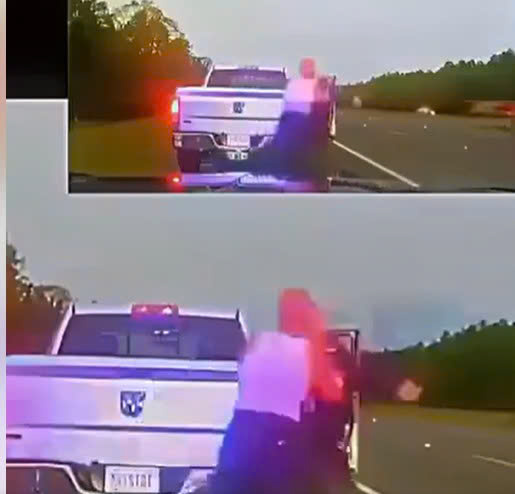On a quiet August morning in Tremonton, Utah, what began as a standard emergency call turned into a tragedy that would leave a small town reeling. On August 18, 2025, police officers responded to what they believed was a routine domestic violence report—only to be met with gunfire that claimed the lives of two officers and injured a third. The shocking turn of events has since raised questions about how quickly situations of domestic unrest can spiral out of control and the challenges faced by law enforcement officers when responding to high-risk calls.

According to official records and court documents, the incident began as a domestic dispute between a 31-year-old woman and her husband, Ryan Michael Bate, 32. Reports indicate that the woman had been assaulted prior to the shooting. Investigators later confirmed that her husband allegedly head-butted her, shoved her against a wall, and threatened her life. Fearing for her safety, she contacted authorities for help. When officers arrived at the residence, they intended to de-escalate the situation and protect those involved. However, within moments, the tense scene erupted into chaos as gunfire rang out, leaving two officers fatally wounded and another seriously injured.
Emergency responders rushed to the scene, but it was too late to save the fallen officers. Tremonton, a normally peaceful town known for its close-knit community, was suddenly thrust into national headlines. Residents gathered for vigils, placing flowers and flags outside the police station, mourning the officers who had given their lives in the line of duty. The town’s mayor called the incident “a heartbreaking reminder of the dangers our officers face every single day,” while local leaders urged unity and compassion during a time of immense grief.
In the aftermath, authorities launched a full-scale investigation. Police quickly detained Ryan Michael Bate, who now faces multiple first-degree murder charges. Prosecutors allege that his actions directly contributed to the deaths of the responding officers and that his prior abuse created a volatile environment that led to tragedy. The suspect remains in custody as the legal process unfolds, and officials have vowed to pursue justice for the victims and their families.
Experts in law enforcement and domestic violence response have weighed in on the case, highlighting the complexity of such calls. Domestic disputes are among the most unpredictable and dangerous situations officers encounter. Even with training, preparation, and protective measures, these cases can escalate in an instant. “When emotions are high and violence is already present, the risk of tragedy increases exponentially,” said one criminal behavior specialist. “It’s not just about policing—it’s about human fear, trauma, and desperation colliding in real time.”
The Tremonton shooting also reignited national discussions about domestic violence prevention and mental health intervention. Advocacy groups emphasized that violence at home often builds gradually, with earlier warning signs overlooked or minimized. The tragedy, they said, underscores the need for stronger community support systems, more accessible mental health resources, and expanded protections for victims before situations reach a breaking point. Some also called for additional funding for officer training and safety equipment, noting that even experienced responders can be caught off guard by volatile domestic situations.
In a broader context, 2025 has seen a concerning rise in violent incidents linked to domestic disputes across the United States. Similar cases in Baltimore, Michigan, and Hamilton have made headlines, revealing a troubling pattern of escalation from private conflict to public tragedy. Analysts attribute this rise to multiple factors, including economic stress, post-pandemic emotional strain, and insufficient access to crisis intervention programs. Many argue that systemic reform—addressing both prevention and response—is urgently needed.
Local officials in Tremonton are working to honor the fallen officers while also reassessing protocols to ensure such a tragedy never happens again. “We owe it to our community and to the families of those we lost to learn from this,” said Tremonton Police Chief David Keller. Plans are already underway to expand domestic violence response teams and improve coordination with social workers, counselors, and victim advocates. The hope is that by identifying warning signs earlier, tragedies like this one can be prevented in the future.
Meanwhile, the victims’ families have received an outpouring of support from across the nation. Law enforcement agencies from other states sent condolences, while residents organized memorial fundraisers to assist the families of the fallen. Messages of solidarity poured in from communities as far as New York and California, demonstrating that even in grief, compassion can bridge the miles between strangers.
The Tremonton incident serves as a sobering reminder of how quickly violence can erupt and how deeply it can wound a community. It has also reignited a painful but necessary conversation about the intersection of domestic abuse, mental health, and law enforcement safety. Each officer who responds to a call enters the unknown, risking their life in service of others. Each victim of abuse faces fear and isolation, often unsure where to turn for help. The tragedy in Tremonton binds these two realities together—a stark example of what can happen when intervention comes too late.
As investigators continue to piece together the full story, Tremonton is left to heal. Candlelight vigils illuminate the streets each evening, and murals honoring the fallen officers are being painted across town walls. The message is clear: though darkness struck without warning, the light of community and remembrance endures.
This heartbreaking event may one day inspire reform—stronger laws, better support for victims, and improved safety measures for those who respond to danger. For now, Tremonton grieves, hoping that through their pain, a safer and more compassionate path forward will emerge.





